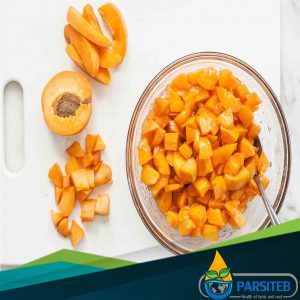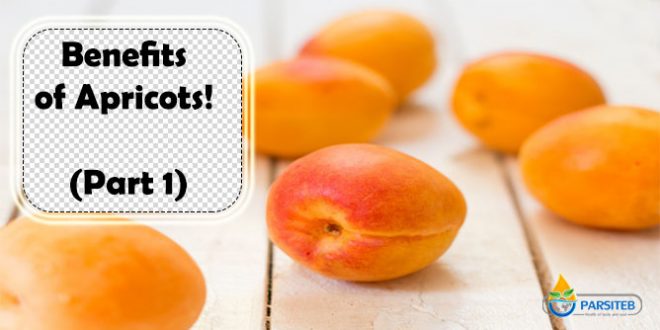Apricots (Prunus armeniaca) are stone fruits also known as Armenian plums.
Round and yellow, they look like a smaller version of a peach but share the tartness of purple plums.
They’re extremely nutritious and have many health benefits, such as improved digestion and eye health.
During this article we propose some of these benefits of
apricots and in the next article we will discuss about others.
Very nutritious and low in calories

Apricots are very nutritious and contain many essential vitamins and minerals.
Just 2 fresh apricots (70 grams) provide:
- Calories: 34
- Carbs: 8 grams
- Protein: 1 gram
- Fat: 0.27 grams
- Fiber: 1.5 grams
- Vitamin A: 8% of the Daily Value (DV)
- Vitamin C: 8% of the DV
- Vitamin E: 4% of the DV
- Potassium: 4% of the DV
Furthermore, this fruit is a decent source of beta carotene, lutein, and zeaxanthin, all of which are potent antioxidants that help fight free radicals in your body.
It’s best to enjoy apricots whole and unpeeled, as the skin boasts large amounts of fiber and nutrients. Be sure to discard the stone, as it’s inedible.
High in antioxidants

Apricots are a great source of many antioxidants, including beta carotene and vitamins A, C, and E.
What’s more, they’re high in a group of polyphenol antioxidants called flavonoids, which have been shown to protect against illnesses, including diabetes and heart disease.
The main flavonoids in apricots are chlorogenic acids, catechins, and quercetin.
These compounds work to neutralize free radicals, which are harmful compounds that damage your cells and cause oxidative stress. Oxidative stress is linked to obesity and many chronic diseases, such as heart disease.
In one study in 2,375 people, researchers developed a scoring system to measure changes in levels of inflammatory markers.
They found that high flavonoid and anthocyanin intakes were associated with a 42% and 73% lower inflammation score, respectively. High flavonoid intake was also tied to a 56% lower oxidative stress score.
May promote eye health

Apricots boast multiple compounds that are essential for eye health, including vitamins A and E.
Vitamin A plays a vital role in preventing night blindness, a disorder caused by lack of light pigments in your eyes, while vitamin E is a fat-soluble antioxidant that enters your eyes directly to protect them from free radical damage.
Meanwhile, beta carotene, which gives apricots their yellow-orange color’ serves as a precursor to vitamin A, meaning that your body can convert it into this vitamin.
Other important apricot carotenoids include lutein and zeaxanthin. Found in the lenses and retinas of your eyes, they safeguard against oxidative stress.
May boost skin health

Eating apricots may
Have benefits for your skin.
The main causes of wrinkles and skin damage are environmental factors, such as the sun, pollution, and cigarette smoke.
What’s more, research indicates a direct link between ultraviolet (UV) light exposure, sunburns, and your risk of melanoma, a deadly form of skin cancer.
Notably, you can fight some of this skin damage through a healthy diet full of antioxidants, which apricots provide.
Vitamins C and E, both found in this fruit, may aid your skin. In particular, vitamin C protects against UV damage and environmental pollutants by neutralizing free radicals.
Furthermore, this vitamin helps build collagen, which gives your skin strength and elasticity. Eating a diet high in vitamin C can help your skin heal from UV damage and prevent wrinkles.
Beta carotene, another apricot nutrient, may protect against sunburns. In a 10-week study, supplementing with beta carotene reduced sunburn risk by 20%.
While you should still use sunscreen, munching on apricots may offer additional protection.
May promote gut health
Apricots may promote gut health.

One cup (165 grams) of sliced apricots provides 3.3 grams of fiber, which is 8.6% and 13.2% of the DV for men and women, respectively.
Apricots contain both soluble and insoluble fiber. The soluble kind dissolves in water and includes pectin, gums, and long chains of sugar called polysaccharides, while the insoluble kind doesn’t dissolve in water and includes cellulose, hemicellulose, and lignin.
Apricots are particularly high in soluble fiber, which is important for maintaining healthy blood sugar and cholesterol levels.
Furthermore, fiber delays the movement of food through your digestive tract and feeds your beneficial gut bacteria. A healthier gut microbiome is linked to a lower risk of obesity.
While a single apricot (35 grams) holds only 0.7 grams of fiber, it’s easy to eat a few in one sitting.
Reference: Healthline
Collected by: Dr Sara Bakhshaei
 Parsi Teb Physical and Mental Health Journal
Parsi Teb Physical and Mental Health Journal 



